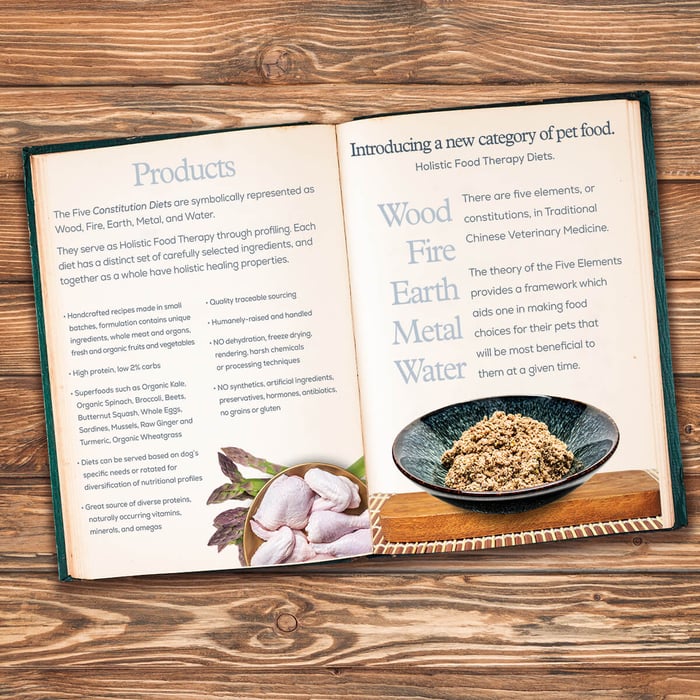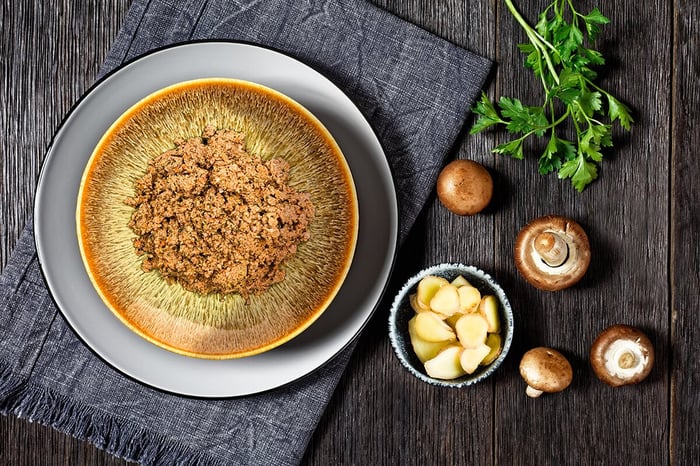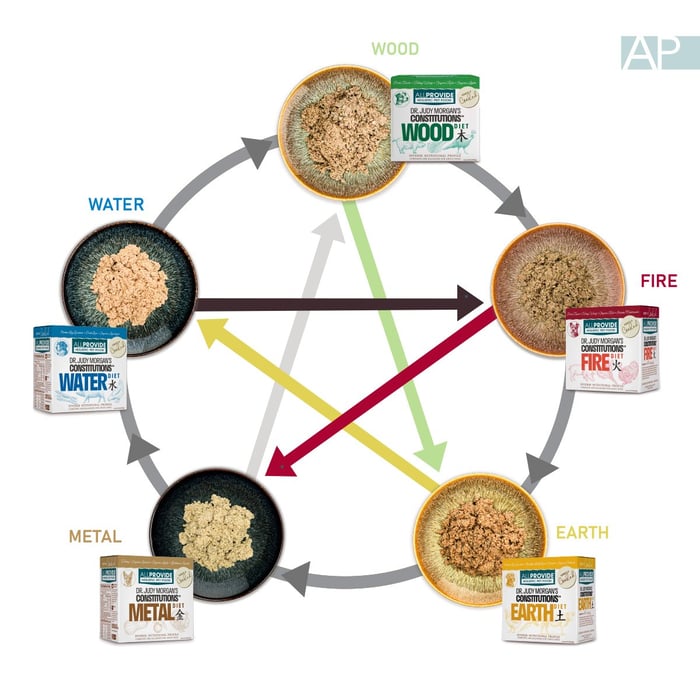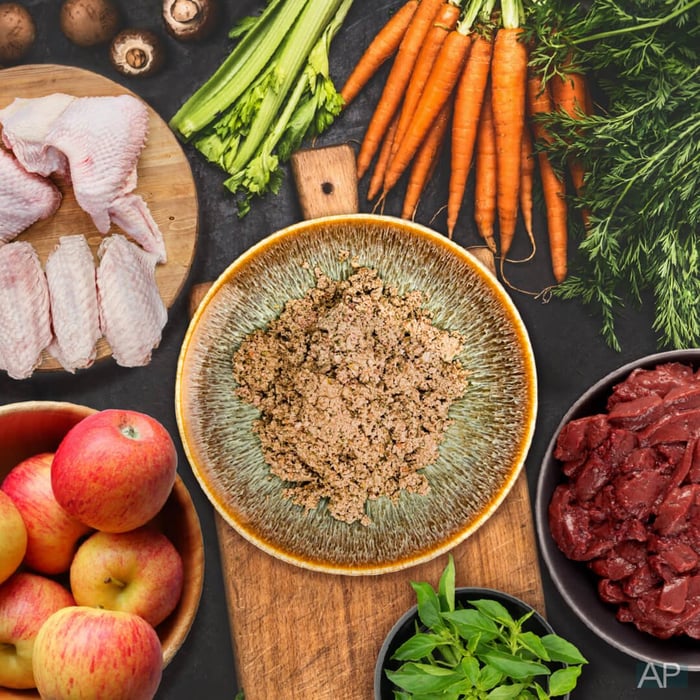Table of Contents
Qi, Jing, and Yin—Oh My! Decoding TCVM’s Unique Terminology

We're Decoding TCVM’s Unique Terminology, for easier understanding. Traditional Chinese Veterinary Medicine (TCVM) speaks a language rooted in nature, energy, and balance—a perspective very different from Western medicine. Instead of focusing solely on disease and symptoms, TCVM views the body as a harmonious ecosystem where Qi, Yin, Yang, and the Five Elements interact like the changing seasons. Rather than diagnosing "arthritis" or "indigestion" in isolation, TCVM identifies imbalances—like Qi Stagnation, Blood Deficiency, or Damp-Heat—that affect the whole being. Organs aren’t just physical structures; the Liver governs emotions and tendons, the Kidneys store Jing (life essence), and the Spleen controls digestion and transformation.This holistic terminology helps explain patterns of health and disease in a way that connects body, mind, and environment. It’s not just about treating illness—it’s about restoring flow, vitality, and natural balance so that pets (and humans!) can thrive.
AllProvide Pet Food offers 5 uniquely curated recipes, formulated by Dr. Judy Morgan following the principles of TCVM. Constitution Diets aid in restoring, balancing and maintaining proper health, targeted for a pet’s specific needs.
The Five Constitution Diets are symbolically represented as Wood, Fire, Earth, Metal, and Water. They serve as Holistic Food Therapy through profiling. Each diet has a distinct set of carefully selected ingredients, and together as a whole have holistic healing properties.
Comprehensive TCVM glossary
Because TCVM uses different terminology, we thought this comprehensive TCVM glossary would provide essential terms related to our diets, energy balance, pathology, organ functions, and holistic healing for pets.
Five Elements Theory (Wu Xing)
The Five Elements represent natural forces that influence the body, behavior, and health. Each corresponds to specific organs, emotions, and seasons:
- Wood (Liver & Gallbladder) – Growth, change, and transformation. Associated with Spring, tendons, and emotions like anger or frustration.
- Fire (Heart & Small Intestine) – Heat, passion, and movement. Linked to Summer, circulation, and joy.
- Earth (Spleen & Stomach) – Stability, nourishment, and digestion. Related to Late Summer, muscles, and worry.
- Metal (Lungs & Large Intestine) – Clarity, organization, and purification. Connected to Autumn, the immune system, and grief.
- Water (Kidneys & Bladder) – Wisdom, resilience, and endurance. Tied to Winter, bones, and fear.
Core Concepts & Energetics
- Tonifies – Strengthens and replenishes deficiencies (Qi, Blood, Yin, or Yang) to restore balance and vitality.
- Jing (Essence) – The body’s fundamental life force, stored in the Kidneys, governing growth, reproduction, and longevity. Depletes with aging, stress, or poor nutrition.
- Qi (Vital Energy) – The life force that drives all bodily functions, supporting immunity, circulation, digestion, and healing. A deficiency leads to fatigue, weakness, and illness.
- Yang (Active Energy) – The warming, moving, and energizing force. Governs metabolism, circulation, and body heat. Deficiency causes coldness, sluggishness, and fatigue.
- Yin (Cooling Energy) – The hydrating, cooling, and nourishing force. Maintains organ function, fluid balance, and body temperature. Deficiency leads to dryness, overheating, and restlessness.
- Shen (Spirit/Mind) – Represents an animal’s mental and emotional state, housed in the Heart. Imbalance causes anxiety, restlessness, or depression.
Body Systems & Functions
- Jiao (Burner/Triple Burner) – The body's metabolic system, regulating temperature, digestion, and fluid balance:
- Upper Jiao – Governs respiration and circulation (Heart & Lungs).
- Middle Jiao – Controls digestion and nutrient absorption (Spleen & Stomach).
- Lower Jiao – Manages elimination, reproduction, and fluid balance (Kidneys, Bladder, Liver, and Intestines).
- Blood (Xue) – More than physical blood, it represents nourishment, circulation, and emotional balance. A deficiency may cause weakness, anxiety, or dull coat/skin.
- Meridians (Channels) – Pathways through which Qi and Blood flow, connecting organs and tissues. Blockages cause imbalances and disease.
- Zang-Fu Organs – The Yin (Zang) and Yang (Fu) organ pairs in TCVM:
- Zang (Yin) – Heart, Liver, Spleen, Lung, Kidney (store vital substances).
- Fu (Yang) – Small Intestine, Gallbladder, Stomach, Large Intestine, Bladder (process and transport substances).
- San Jiao (Triple Burner) – A concept in TCVM describing three interconnected energy centers responsible for regulating metabolism, fluid balance, and organ function.
Pathogenic Factors & Imbalances
- Dampness – Excess moisture in the body, causing sluggishness, fluid retention, poor digestion, and joint stiffness. Often linked to a weak Spleen.
- Phlegm – A thickened form of Dampness that blocks Qi flow, leading to tumors, cysts, chronic congestion, and poor digestion.
- Wind – Represents sudden, erratic movement in the body, such as skin allergies, itching, tremors, seizures, or joint pain.
- Heat (Excess Yang) – An overabundance of warming energy, causing inflammation, hyperactivity, restlessness, excessive thirst, and irritability.
- Cold (Excess Yin or Yang Deficiency) – Leads to poor circulation, sluggish digestion, stiffness, and intolerance to cold.
- Stagnation – The obstruction of Qi, Blood, or Fluids, causing pain, bloating, tension, or emotional distress.
- Deficiency – A lack of Qi, Blood, Yin, or Yang, leading to fatigue, weak immunity, slow healing, and dull coat/skin.
- Excess – An overabundance of pathogenic factors (Heat, Cold, Damp, Wind), resulting in agitation, inflammation, bloating, or stiffness.
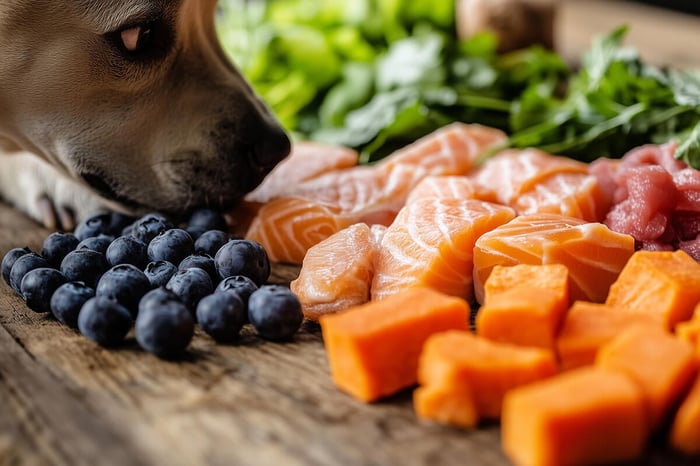 Treatment & Healing Methods
Treatment & Healing Methods
- Food Therapy – Using diet to restore balance by selecting foods based on their energetic properties (warming, cooling, tonifying, etc.).
- Acupuncture – Inserting fine needles along meridians to stimulate Qi flow, relieve pain, and support organ function.
- Herbal Medicine – Using TCVM herbs to target imbalances and restore health naturally.
- Tui Na (Chinese Massage Therapy) – A hands-on therapy combining massage, acupressure, and manipulations to support circulation and energy flow.
- Moxibustion – Burning mugwort (Ai Ye) near acupuncture points to warm and tonify the body, especially useful for Yang Deficiency.
- Gua Sha – A scraping therapy that improves circulation, reduces stagnation, and relieves muscle tension.
Don't worry, there won't be a test.
For more reading, visit our comprehensive guide on Dr. Judy Morgan's Constitution Diets.
To find out which element your pet is, take the free TCVM personality quiz
⭐️ Order Dr. Judy Morgan's Constitution Diets or any of our recipes today! Visit www.allprovide.com

